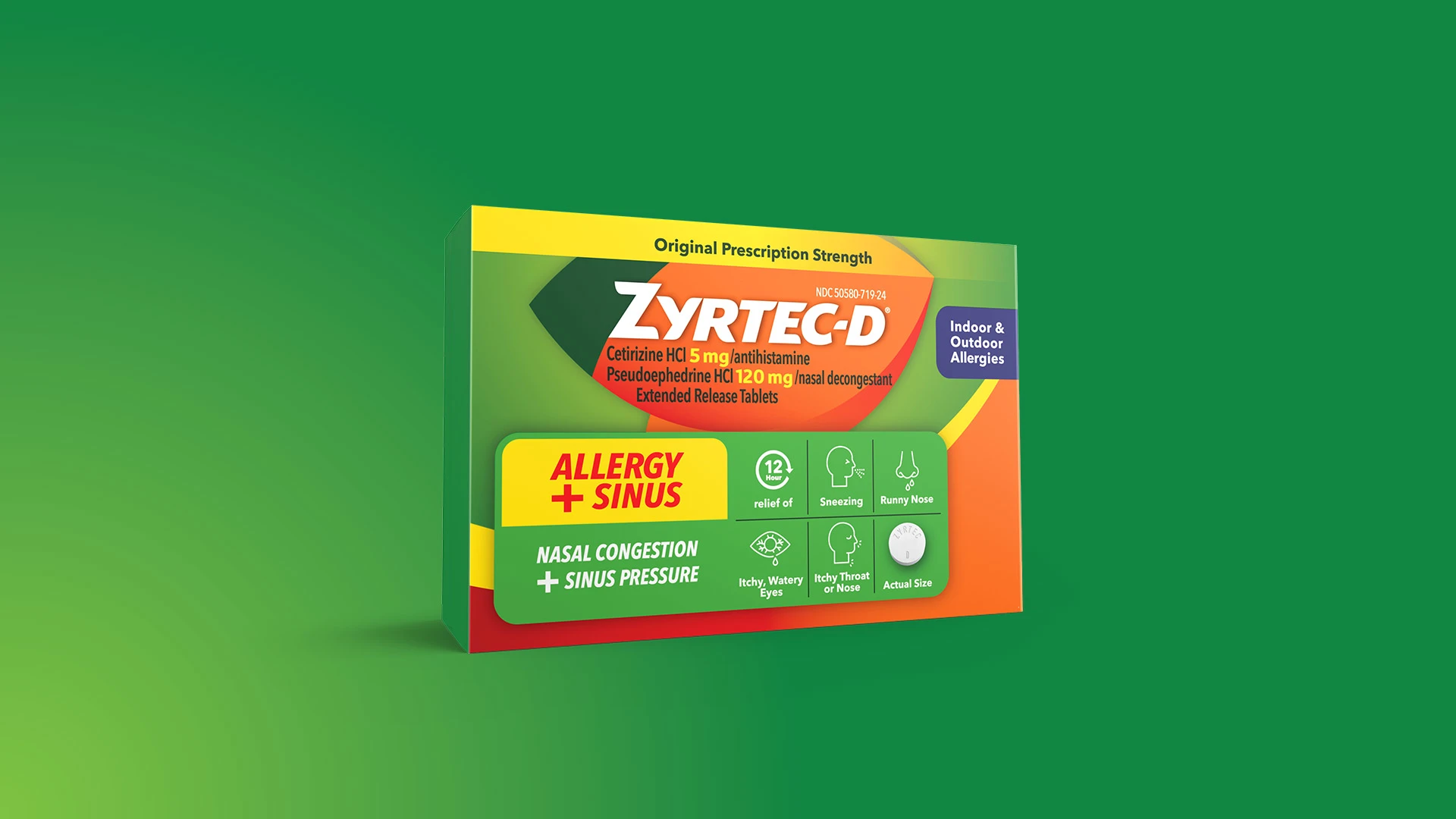Can allergies cause headaches?
Yes. Sometimes congestion due to allergies can lead to a sinus headache. When an allergic reaction is set off, the body releases histamine, which can cause inflammation and swelling in the nasal passages and sinuses. This swelling can cause pressure to build up in the sinuses and lead to pain in your head.2
Allergy headache symptoms
What does an allergy headache feel like? Allergy headaches can feel like a pressure in the head, often accompanied by other allergy symptoms such as sneezing, a runny nose, and itchy eyes. A sinus headache is usually located around the blocked sinuses.2
Allergy headaches are caused by a variety of symptoms, including7:

Sinus Pressure

Congestion or stuffy nose
It can be a bit tricky to pin down if allergies are the culprit behind your headache, but here are a few signs to keep an eye out for2:
Other symptoms: If you're dealing with other allergy symptoms —sneezing, a runny nose, itchy eyes, and especially sinus congestion—it's a good bet that your headache is from the sinus pressure of your allergies. However, if you have symptoms like nausea or sensitivity to light, you may be experiencing a migraine.7
Seasonal patterns: If your headaches are showing up like clockwork during certain times of the year, especially when the pollen count is high, and you are experiencing allergy congestion, it's a strong clue that allergies are the culprit.
Allergy meds to the rescue: If your headaches ease up after taking allergy medication, it's a good sign that they are caused by allergies.
Is my headache caused by allergies or a migraine?
Some people may confuse sinus headaches from allergies with a migraine. Sinus headaches causes swelling in the sinus cavities, causing pressure to build-up and pain in the sinus area. Migraines include throbbing pain or pulsing sensation, usually on one side of the head. It can also cause nausea and extreme sensitivity to sound and light.4 Talk to your doctor to better understand what kind of headache you may be experiencing and the right treatment for you.
Allergy headache relief: treatments & remedies
There are a number of things you can do to treat allergy headaches, including2:

Steer clear of allergens:
The best way to sidestep allergy headaches is to avoid the allergens that trigger them. If you know what sets you off, do your best to keep your distance.

Medication can help:
There are plenty of over-the-counter and prescription options to help you find relief from allergy headaches. Allergy medications like ZYRTEC-D® could be a game-changer for you by helping to relieve allergy symptoms and sinus congestion. You can also try an over-the-counter pain medication. A chat with your doctor can point you in the direction of what's best for you.

Embrace a hot shower:
Let the steam work its magic, clearing your sinuses and easing the pressure caused by an allergy headache.

Drink water:
This can help thin out the mucus in your nose, which can help relieve congestion and pressure caused by allergy headaches.

Bring in a humidifier:
A humidifier can be your best friend in adding moisture to the air, which in turn can help relieve congestion.11
References
https://my.clevelandclinic.org/health/diseases/8622-allergic-rhinitis-hay-fever
Saberi A, Nemati S, Shakib RJ, Kazemnejad E, Maleki M. Association between allergic rhinitis and migraine. J Res Med Sci. 2012 Jun;17(6):508-12. PMID: 23626624; PMCID: PMC3634285.,
https://nationalheadacheinstitute.com/blog/can-food-allergies-cause-headaches/
https://americanmigrainefoundation.org/resource-library/sinus-headache/
Ferretti A, Gatto M, Velardi M, Di Nardo G, Foiadelli T, Terrin G, Cecili M, Raucci U, Valeriani M, Parisi P. Migraine, Allergy, and Histamine: Is There a Link? J Clin Med. 2023 May 19;12(10):3566. doi:10.3390/jcm12103566. PMID: 37240671; PMCID:PMC10218803,
https://www.health.harvard.edu/staying-healthy/treatments-for-post-nasal-drip
Links to other parties’ articles and websites are provided for convenience only. Kenvue is not responsible for their content.




